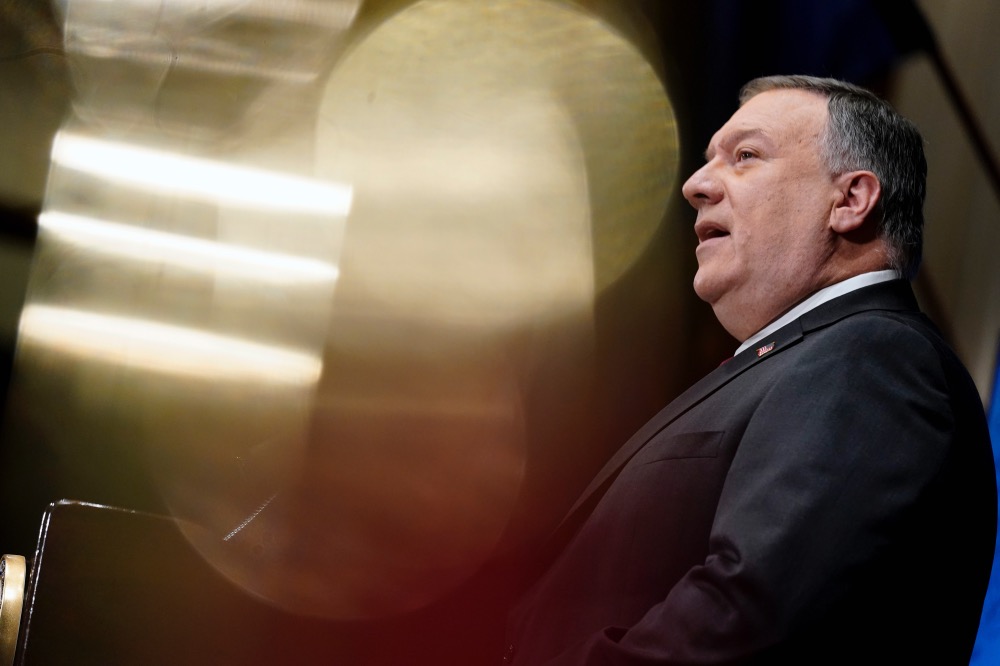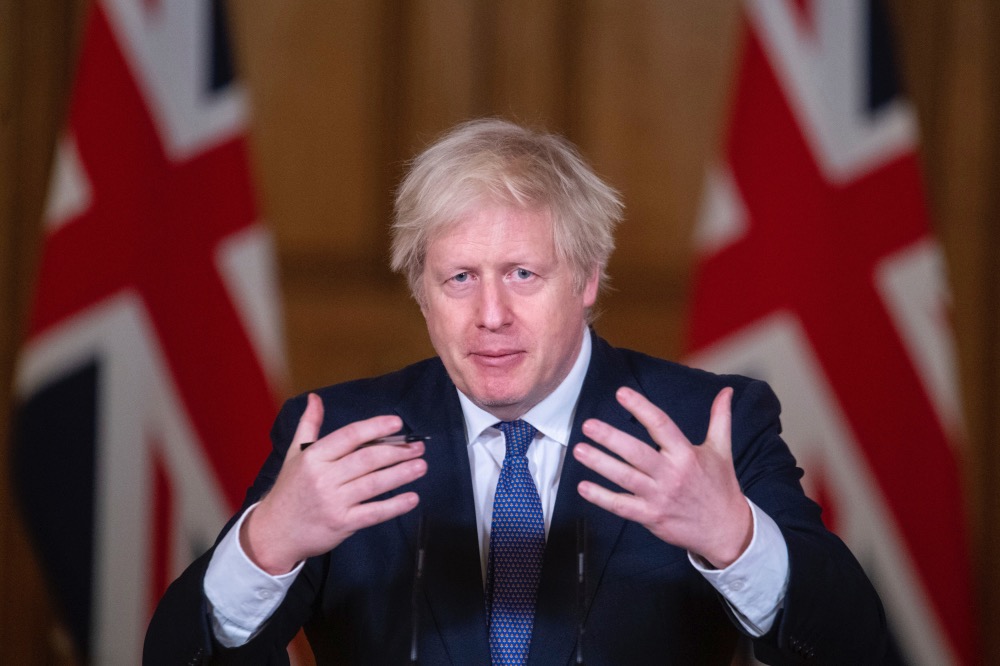Washington DC, US
AP
On his way out the door, Secretary of State Mike Pompeo lashed out anew at China on Tuesday by declaring that its policies on Muslims and ethnic minorities in the western Xinjiang region constitute “crimes against humanity” and a “genocide”. The rarely used designation is sure to provoke an angry response from Beijing.
Pompeo made the determination just 24 hours before President-elect Joe Biden takes office. There was no immediate response from the incoming Biden team, although he and members of his national security team have expressed support for such a designation in the past.

Secretary of State Mike Pompeo speaks at the National Press Club in Washington on Tuesday, 12th January, 2021. PICTURE: AP Photo/Andrew Harnik, Pool.
Pompeo’s determination does not come with any immediate repercussions although the legal implications mean the US must take it into account in formulating policy toward China. The US has spoken out and taken action, implementing a range of sanctions against senior Chinese Communist Party leaders and state-run enterprises that fund the architecture of repression across Xinjiang.
Many of those accused of having taken part in the repression are already under US sanctions. The genocide designation means new measures will be easier to impose.
‘GENOCIDE’ CLAUSE TO CHINA TRADE DEALS NARROWLY DEFEATED IN UK
British Prime Minister Boris Johnson narrowly avoided a defeat in Parliament on Tuesday after lawmakers voted against a controversial proposal seeking to bar trade deals with any country deemed by the UK High Court to be committing genocide.
The amendment to the government’s post-Brexit trade bill was largely designed to force international action in addressing China’s alleged human rights abuses against the Uighur minority in the far western Xinjiang region.

Britain’s Prime Minister Boris Johnson speaks during a media briefing on COVID-19, in Downing Street, London, on Friday 15th January. PICTURE: Dominic Lipinski/Pool via AP.
Campaigners had said that if the proposal passed, Britain would become the first country in the world to allow genocide cases to be considered in domestic courts.
Johnson’s working majority stood at just 11 after lawmakers rejected the proposal in a 319 to 308 vote.
Under the proposal, minorities alleging they have been the subject of genocide can for the first time apply to the High Court of England and ask for judges to determine if a country trading with the UK has perpetrated genocide. If the court makes a preliminary ruling against that country, Britain’s government would be forced to revoke bilateral trade agreements.
The move had earlier passed by a majority in Parliament’s upper House of Lords, and had the backing of all opposition parties and a significant number of rebel Conservatives. Leaders from Britain’s Jewish, Muslim and Christian communities also supported it.
Johnson has been facing increasingly vocal calls within his Conservative party for a stronger and more coherent policy on China that counters the country’s rights abuses and violations of international norms.
Foreign Secretary Dominic Raab last week called the trade bill amendment “well-meaning” but ineffective and counter-productive.
But in a joint letter to lawmakers urging them to back the amendment, the opposition Labour Party’s foreign affairs spokeswoman, Lisa Nandy, and international trade spokeswoman, Emily Thornberry, said voting for the proposal will send a clear message that “when the most serious violations of human rights occur we will not turn away.”
“In particular, we are all gravely concerned about the situation in Xinjiang and the growing body of evidence of the systemic human rights abuses being committed by the Chinese government on an industrial scale against the Muslim Uighur people and other minorities,” they said.
Those backing the British parliamentary measures argued that despite mounting evidence of atrocities targeting Uighurs in Xinjiang, the United Nations is highly unlikely to refer Beijing to the International Criminal Court because China, a permanent member of the Security Council, will veto the move.
Johnson’s office said his government had a “proud record” standing up for human rights in China.
“We recognise the strength of feeling but the government doesn’t support the amendment,” his press secretary, Allegra Stratton, said.
– SYLVIA HUI, AP
“After careful examination of the available facts, I have determined that since at least March 2017, the People’s Republic of China, under the direction and control of the Chinese Communist Party, has committed crimes against humanity against the predominantly Muslim Uyghurs and other members of ethnic and religious minority groups in Xinjiang,” Pompeo said in a statement.
“In addition, after careful examination of the available facts, I have determined that the PRC, under the direction and control of the CCP, has committed genocide against the predominantly Muslim Uyghurs and other ethnic and religious minority groups in Xinjiang. I believe this genocide is ongoing, and that we are witnessing the systematic attempt to destroy Uyghurs by the Chinese party-state.”
A main reason cited for the declaration of genocide was widespread forced birth control among the Uighurs, which The Associated Press documented last year. Another reason cited, Uighur forced labour, has also been linked by AP reporting to various products imported to the US, including clothing and electronic goods such as cameras and computer monitors.
Tuesday’s move is the latest in a series of steps the outgoing Trump administration has taken against China.
Since last year, the administration has steadily ramped up pressure on Beijing, imposing sanctions on numerous officials and companies for their activities in Taiwan, Tibet, Hong Kong and the South China Sea.
Those penalties have gotten harsher since the beginning of last year when President Donald Trump and Pompeo began to accuse China of trying to cover up the coronavirus pandemic. Just on Saturday, Pompeo lifted restrictions on US diplomatic contacts with Taiwanese officials, prompting a stern rebuke from China, which regards the island as a renegade province.
Five days ago, the administration announced it would halt imports of cotton and tomatoes from Xinjiang with Customs and Border Protection officials saying they would block products from there suspected of being produced with forced labor.
Xinjiang is a major global supplier of cotton, so the order could have significant effects on international commerce. The Trump administration has already blocked imports from individual companies linked to forced labor in the region, and the US has imposed sanctions on Communist Party officials with prominent roles in the campaign.
China has imprisoned more than one million people, including Uighurs and other mostly Muslim ethnic groups, in a vast network of concentration camps, according to US officials and human rights groups. People have been subjected to torture, sterilisation and political indoctrination in addition to forced labour as part of an assimilation campaign in a region whose inhabitants are ethnically and culturally distinct from the Han Chinese majority.
China has denied all the charges. China says its policies in Xinjiang aim only to promote economic and social development in the region and stamp out radicalism. It also rejects criticism of what it considers its internal affairs.
The genocide designation is a rare step for the US Government, which did not apply it to the 1994 mass killings in Rwanda until much later.
Former Secretary of State Colin Powell designated the situation in Sudan’s western Darfur region a genocide in 2004. Former Secretary of State John Kerry applied the term to the Islamic State’s repression and massacres of Yazidis and other ethnic and religious minorities in Syria and Iraq in 2016, but he couched it by saying it was a legal determination only that did not mandate action by the US Government.
Human rights groups, which have been generally critical of Trump administration policies, welcomed the move, which Pompeo said was taken with an eye toward the US role in prosecuting Nazi war crimes during WWII at the Nuremberg trials.
“We hope to see the US follow these strong words with decisive action,” said Grant Shubin of the Global Justice Center. “Where there is a risk of genocide, there is a duty to act. Moving forward, this designation should inform the entirety of US foreign policy and we hope to hear more from the incoming Biden administration on how it plans to follow through on this historic announcement.”
And, some questioned the decision to apply it to China and Xinjiang and not to the situation in Myanmar, where Rphingya Muslims have been subjected to significant attacks and atrocities.
“The Secretary’s statement underscores the importance of appropriate international investigations and prosecutions of officials for the crime of genocide in Xinjiang,” said Eric Schwartz, the president of Refugees International. “At the same time, I’m baffled and deeply concerned that Secretary Pompeo has declined to make a similar finding of genocide against the state of Myanmar for its vicious mass attacks against the Rohingya population beginning in August 2017.”
– With BEN FOX






